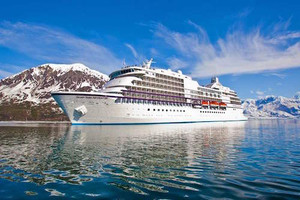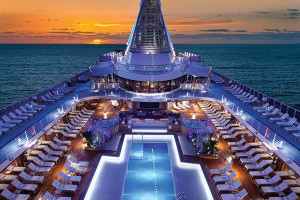
Cruising is the perfect escape, whether it’s your annual getaway from it all, or a trip of a lifetime to celebrate a big birthday, an anniversary, or a special family reunion. Whatever your reasons for heading for the high seas, if you’re new to cruise holidays you’re bound to have plenty of questions. Here’s our top pick of the most common ones.
What’s a good itinerary for a first-timer?
We recommend a seven night cruise, with plenty of ports of call on the itinerary. Week-long cruises are not too long, and allow plenty of time for you to enjoy the on board experience, whether it’s a luxury cruise around the Mediterranean, or a three star coastal Sydney return cruise. Avoid itineraries with long crossings in open water, and itineraries with too many sea days until you're sure cruising is for you.
Do I need to take any money, and how much should I budget per day?
Cruise ship life is largely cashless, but you will need money to spend ashore. Our recommendation is to take a small amount of local currency with you depending on your cruise destination, plus a small amount of the ship’s on board currency. You can also use a credit or debit card on board, and in most countries, and you can exchange currency on ships. As for your budget, this depends on how many ports of call you are visiting and what you plan to do there, as well as how many people are in your party.
What’s the etiquette on tipping?
This depends on the cruise line, as some include gratuities in the fare, or they add a daily gratuity per guest to your shipboard account for you to pay at the end. Bar bills often have an automatic 15 or 18 percent gratuity included, as do specialty coffees, spa services and fitness classes, so check your receipts, and if the gratuity line is blank, don’t fill it in as you’ll end up tipping twice.
Do I need special travel insurance?
You will need a good quality international travel insurance which covers a cruising holiday, even if you’re only taking a domestic cruise. Make sure everyone travelling is covered, and if you’re planning to participate in sports such as scuba diving, check that you’re covered for these also. And if you have a preexisting medical condition, pack adequate supplies of any medications you take, and carry copies of prescriptions and a letter from your doctor or specialist in case you become ill on board or ashore.
How much luggage can I take, and what should I pack?
Most cruise lines don’t have luggage restrictions, but you need to consider the size of stateroom you’ve booked, and what storage space you will have. And if you are flying to or from your cruise holiday, there will be restrictions on what you can check in depending on which flight class you’re travelling in. Common things on everyone’s packing list for a cruise should include clothing to suit the climate you’re cruising in, a pair of swimmers to use in the pool or spa, a pair of deck or walking shoes, a day pack for exploring ashore, books to read, and any essential toiletries or medications.
What if I get sea sick?
Although modern ocean going ships have stabilisers to help them manage rough seas, if you’re not sure of the state of your sea legs, choose a stateroom in the most stable part of the ship; that’s towards the centre, and on a lower deck. Also pack some over-the-counter remedies for sea sickness, and avoid long crossings in open waters, very small ships, and cruising in areas which are known to have temperamental weather.
Can I get off if I don’t like it?
You can, but it would be a terrible waste of money and expensive in terms of getting home - and you won’t get a refund. The key to happy cruising is to do your research, and pick the right ship and itinerary. And remember all cruises give you the opportunity to go ashore at ports of call. On a river cruise, for example, you’ll travel through the heart of a country docking at villages, towns and cities every day, so you will spend plenty of time off-ship as well as on board.
Should we travel with others, or go it alone?
Although many people cruise with family or with friends, it is also a great way to make new friends. River ships are a good example. They tend to be small and carry up to 170 people, with dining rooms and lounges designed to be social spaces where people mingle and chat about the amazing experiences they’ve had that day. Whether you travel on your own, as a couple or in a larger group, you will always be a part of the action.
Are some ships better for specific age groups than others?
Do your research, or get a travel agent to help you decide which cruise is best for you. A good travel agent can give you an idea of what life aboard a high seas or river cruise is like, and who it is aimed at. For example, most river cruises attract people aged 55 and over, who are keen to do sightseeing, enjoy a relaxed onboard lifestyle, and appreciate value for money, while other ships are more geared towards couples and families.
Will I have to sit with the same people every night at dinner?
This depends on the cruise line, and the ship. Some offer flexible dining times with open seating, while others have fixed times and tables. People can choose to sit where they like in the dining rooms on river ships and smaller ships so that they can meet new friends, while others prefer to meet up with the same people every night. The choice is yours.
What visas will I need, and do I need to organise one for every port of call?
This depends on your itinerary, and your passport. In some ports of call such as Bali, a visa can be issued on arrival for a fee, but in countries including China, you’ll need to organise one before you cruise. If you are visiting several destinations in a country you may also need a multi-entry visa. And if your passport is close to expiring, get it renewed.
Will I be able to stay in touch with family while I’m away?
All cruise ships have “ship-to-shore” communications including telephones and internet but these services can be expensive, and extremely slow. Some cruise lines include free Wi-Fi in the fare, or you take advantage of free Wi-Fi hotspots in ports of call and use an app such as Skype to call home.
What kind of shopping is available on board?
This depends on the ship, however, there is usually duty free alcohol, cigarettes, perfumes, jewellery and skin care available, shops selling cruise attire such as hats and tee-shirts, and specialty designer shops selling clothing. On some ships you can also buy snacks, toiletries and pharmacy goods, but the choice is often limited and expensive.
Can I take my own alcohol on board?
Cruise lines have tightened their alcohol policies in recent years, and the rules vary. Some luxury, all-inclusive ships allow you to BYO, while others only allow a small number of bottles of wine per person which attract a hefty corkage fee if you open them outside of your stateroom. Cruise passengers find inventive finding ways to “smuggle” alcohol to save paying for it on board, but the authorities are up to all the tricks, and if you get caught you risk being refused embarkation.
Do I have to take ship's tours?
No, you don’t, but be aware that if you explore independently, or book a non-ship tour in a port of call, you’re responsible for getting yourself back to the ship on time; the ship won’t wait for you if you’re late. You can also use port days to enjoy the ship when most guests are off exploring ashore, and have a quiet read up on deck around the pool.
What's included in the fare?
This largely depends on which cruise, and cruise line, you choose. Most cruises include on board accommodation, meals excluding specialty restaurants, most on board activities and entertainment, use of the fitness and pool facilities, port charges, government fees and some include on board gratuities. Additional charges can range from your daily latté and alcoholic drinks, to internet access, laundry and spa treatments.
- By:
- Joanna Hall






